- Home
- Quizzes
- My Quiz Activity
- Newsletters
- Sports Betting
- MY FAVORITES
- Add Sports/Teams
- SPORTS
-
NFL
- NFL Home
- Arizona Cardinals
- Atlanta Falcons
- Baltimore Ravens
- Buffalo Bills
- Carolina Panthers
- Chicago Bears
- Cincinnati Bengals
- Cleveland Browns
- Dallas Cowboys
- Denver Broncos
- Detroit Lions
- Green Bay Packers
- Houston Texans
- Indianapolis Colts
- Jacksonville Jaguars
- Kansas City Chiefs
- Las Vegas Raiders
- Los Angeles Chargers
- Los Angeles Rams
- Miami Dolphins
- Minnesota Vikings
- New England Patriots
- New Orleans Saints
- New York Jets
- New York Giants
- Philadelphia Eagles
- Pittsburgh Steelers
- San Francisco 49ers
- Seattle Seahawks
- Tampa Bay Buccaneers
- Tennessee Titans
- Washington Commanders
-
MLB
- MLB Home
- Arizona Diamondbacks
- Atlanta Braves
- Baltimore Orioles
- Boston Red Sox
- Chicago White Sox
- Chicago Cubs
- Cincinnati Reds
- Cleveland Guardians
- Colorado Rockies
- Detroit Tigers
- Houston Astros
- Kansas City Royals
- Los Angeles Angels
- Los Angeles Dodgers
- Miami Marlins
- Milwaukee Brewers
- Minnesota Twins
- New York Yankees
- New York Mets
- Oakland Athletics
- Philadelphia Phillies
- Pittsburgh Pirates
- San Diego Padres
- San Francisco Giants
- Seattle Mariners
- St. Louis Cardinals
- Tampa Bay Rays
- Texas Rangers
- Toronto Blue Jays
- Washington Nationals
-
NBA
- NBA Home
- Atlanta Hawks
- Boston Celtics
- Brooklyn Nets
- Charlotte Hornets
- Chicago Bulls
- Cleveland Cavaliers
- Dallas Mavericks
- Denver Nuggets
- Detroit Pistons
- Golden State Warriors
- Houston Rockets
- Indiana Pacers
- Los Angeles Clippers
- Los Angeles Lakers
- Memphis Grizzlies
- Miami Heat
- Milwaukee Bucks
- Minnesota Timberwolves
- New Orleans Pelicans
- New York Knicks
- Oklahoma City Thunder
- Orlando Magic
- Philadelphia 76ers
- Phoenix Suns
- Portland Trail Blazers
- Sacramento Kings
- San Antonio Spurs
- Toronto Raptors
- Utah Jazz
- Washington Wizards
-
NHL
- NHL Home
- Anaheim Ducks
- Arizona Coyotes
- Boston Bruins
- Buffalo Sabres
- Calgary Flames
- Carolina Hurricanes
- Chicago Blackhawks
- Colorado Avalanche
- Columbus Blue Jackets
- Dallas Stars
- Detroit Red Wings
- Edmonton Oilers
- Florida Panthers
- Los Angeles Kings
- Minnesota Wild
- Montreal Canadiens
- Nashville Predators
- New Jersey Devils
- New York Islanders
- New York Rangers
- Ottawa Senators
- Philadelphia Flyers
- Pittsburgh Penguins
- San Jose Sharks
- Seattle Kraken
- St. Louis Blues
- Tampa Bay Lightning
- Toronto Maple Leafs
- Vancouver Canucks
- Vegas Golden Knights
- Washington Capitals
- Winnipeg Jets
- NCAAF
- NCAAM
- Boxing
- Entertainment
- Lifestyle
- Golf
- MMA
- Soccer
- Tennis
- Wrestling
- More Sports
- RESOURCES
- My Account
- YB on Facebook
- YB on Twitter
- YB on Flipboard
- Contact Us
- Privacy Policy
- Terms of Service
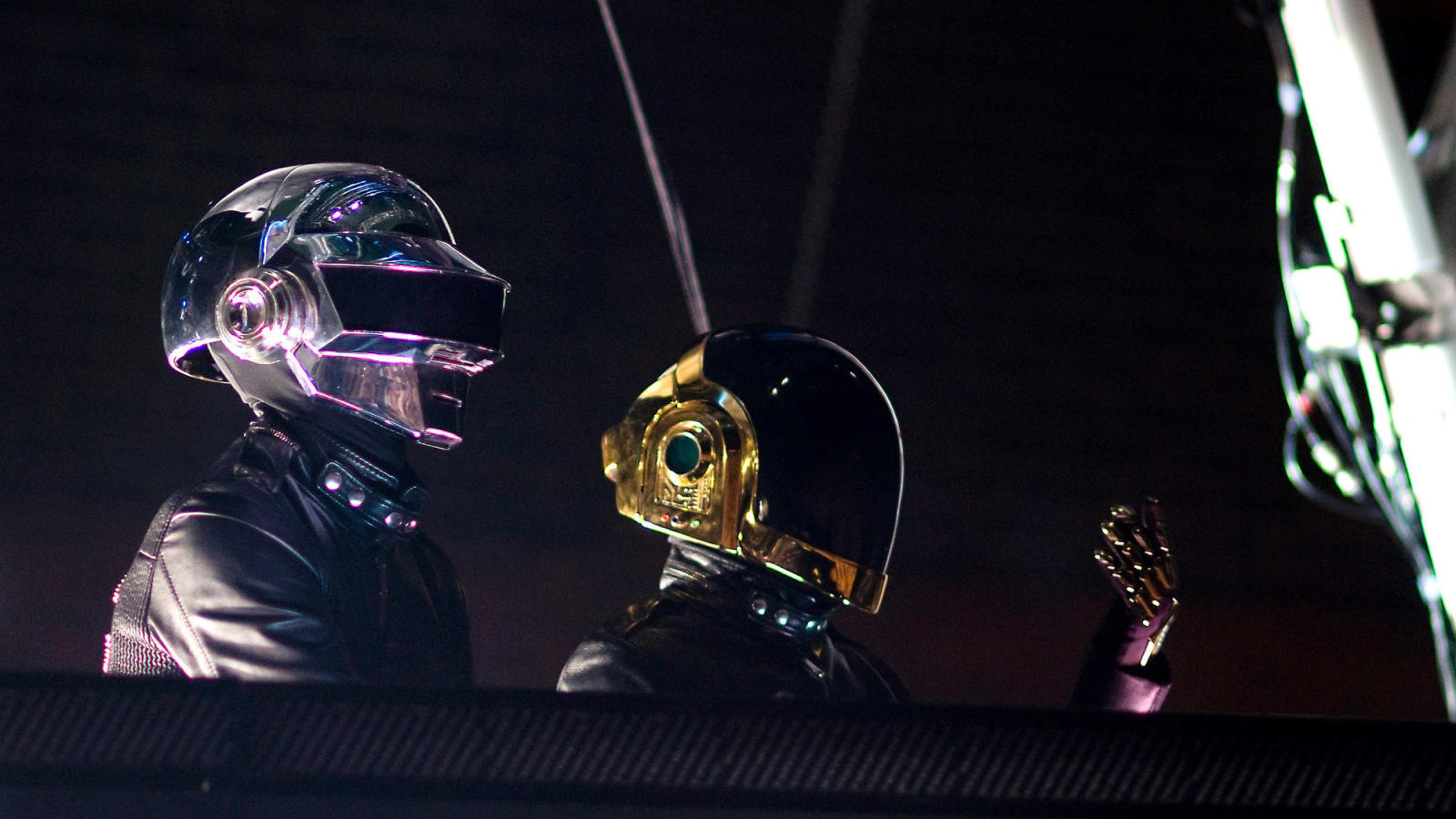
On 22 February 2021, Daft Punk uploaded their first video in over five years to their YouTube channel. Titled "Epilogue," the short narrative showed the two French robots (Thomas Bangalter and Guy-Manuel de Homem-Christo) saying goodbye by blowing up Bangalter's famously masked alter-ego. A publicist soon confirmed the unthinkable: after years of inactivity, one of the most revolutionary acts in all of dance and pop music was done, rounding out their legacy.
We were all saddened upon hearing of this, but our hearts are still filled with digital love. To celebrate their achievements, we're putting together the Essential Daft Punk Playlist, rounding up songs from across their storied career. Many of these you may have already heard before, but most of these songs still sound great even when hearing them ... one more time.
"Da Funk" (1995)

The track that started it all -- quite literally. Thomas and Guy-Manuel did drop a song a year prior called "The New Wave" (the single of which contained an early version of their legendary "Alive"), it was the instantly-memorable warped synth sound of "Da Funk" that gained the duo some popularity, eventually becoming the item that landed them a major record deal. As is the case with Daft Punk's best work, "Da Funk" is repetitious in the best way, each new melodic loop adding in some small element that wasn't there before, giving the song a natural progression without sacrificing the hard-hitting groove that's set to that piercing kick sound. The surrealistic slice-of-life music video for the song (directed by a young Spike Jonze) only helped further the duo's then-burgeoning legacy.
"Revolution 909" (1997)
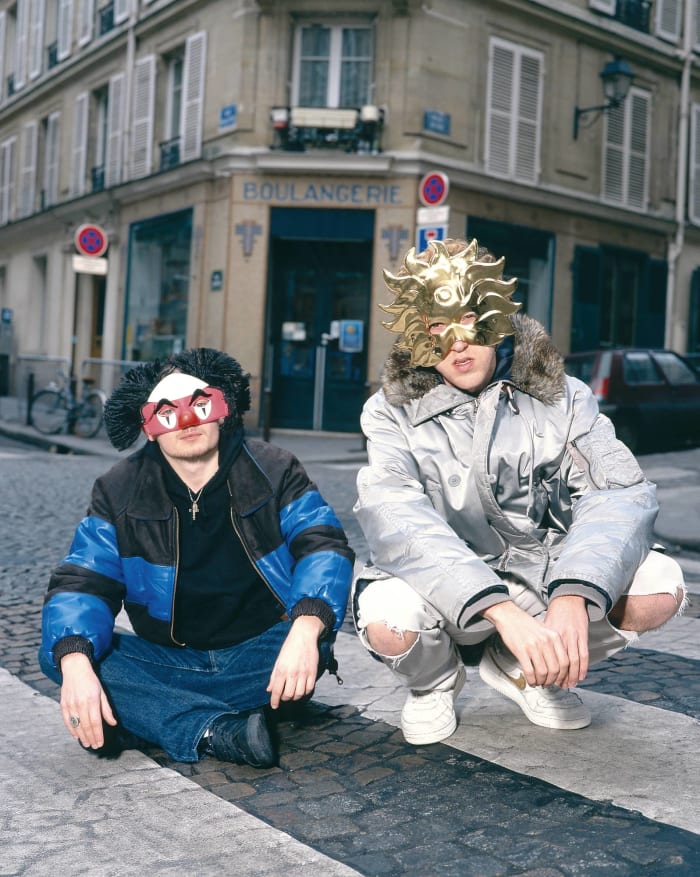
"Stop the music and go home," says the voice of authority with a bit of a bored tone in its voice, perhaps knowing this order is going to be ignored. Maybe he knows that the song playing is "Revolution 909", and the club kids would not be able to resist its infectious groove. Understated to a glorious fault, "Revolution 909" is solely about propulsion, the kind of sweet-blackened groove that feels like it stretches on for nine minutes when, in fact, it's just over five. A timeless cut.
"Around the World" (1997)
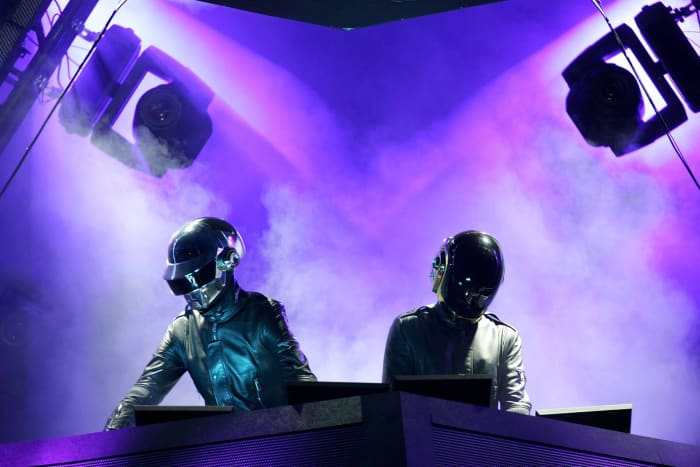
Once again touching on iconic music videos, Michel Gondry's treatment for "Around the World" actually enhanced what was already great about the song: swimmers represented the synths, robots symbolized the vocals, there were weirdly tall guys standing in for that addictive descending bassline, etc. It was a colorful bit of self-contained chaos. Still, out of such seemingly simple elements, the bots managed to craft a crossover pop hit that manages to have layers, progression, and pure dance euphoria -- all with nothing more than three words repeated over and over again. Fun fact: that vocal hook is in your head right now.
"Burnin'" (1997)
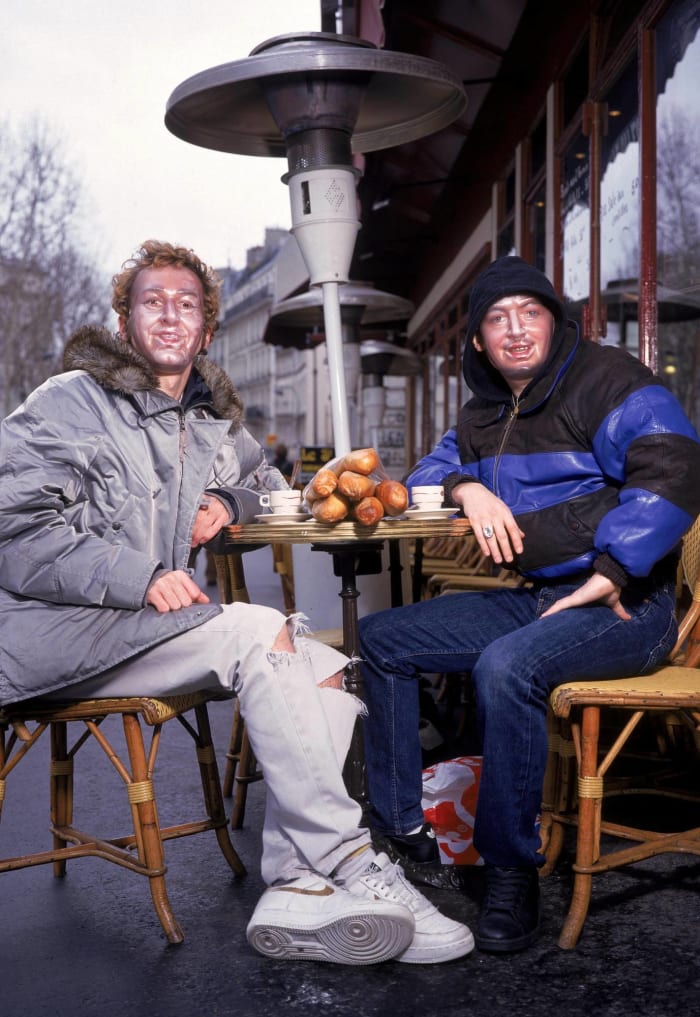
Built off a quick clip of the Bar-Kays "Freaky Behavior", "Burnin'" represented everything that was satisfying about the late-'90s "Big Beat" wave. Along with acts like Fatboy Slim, the legendary Basement Jaxx, and early Daft Punk supporters The Chemical Brothers, "Burnin'" marries dance music's four-on-the-floor aesthetic with rock-n-roll's undeniable strut. As the synths and high-pitched devices work their way up, it's that lithe, funky bass that makes us simply unable to move our bodies. Kicking off the extraordinary ending run of tracks to their influential debut album "Homework", "Burnin'" doesn't waste a second if its nearly seven-minute length.
"Music Sounds Better Without You [Stardust]" (1998)
!["Music Sounds Better Without You [Stardust]" (1998)](http://res.cloudinary.com/ybmedia/image/upload/c_crop,h_1333,w_2000,x_0,y_0/c_scale,f_auto,q_auto,w_700/v1/m/1/4/1418e6bfc8705566ea36cedf1d21102b6cdb54cc/music-sounds-better-stardust-1998.jpg)
When talking about Daft Punk's truly essential works, one can't gloss over the bots' numerous collaborations and occasional side projects. One of the most curious detours in their discography is Stardust, the group that Thomas Bangalter formed with friends Benjamin Diamond and DJ Alan Braxe. The trio only released one single, but they didn't need to make any more to have an impact on the course of pop music. Built off of a sneaky guitar riff culled from Chaka Khan's "Fate", the shiny and hypnotic groove that Stardust achieves holds up to endless repeat listens, which is a good thing because even this sample-based song itself has been sampled in countless dance tracks since its release.
"One More Time" (2000)

Splicing up three short sections of Eddie Johns' 1979 track "More Spell on You" and repeating them ad infinitum, "One More Time" is one of the greatest dance-pop songs ever made and arguably Daft Punk's signature track. With a joyous momentum and truly infectious earworm of a groove, "One More Time" gets that added personality courtesy of an incredible vocal turn by the late Romanthony. From his digitally-altered tones to his unique vocal stylings (the way he sings "you can't stop-ah!" is forever embedded in our brains), "One More Time" is a party anthem unlike any other, nearly universal in appeal and infinitely replayable in effect. You can play it one more time, and it will still sound grocery-store fresh.
"Digital Love" (2001)
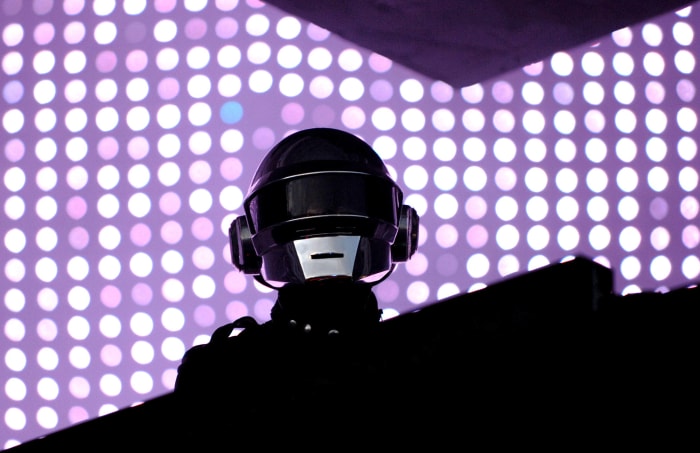
Featuring a rare vocal turn by the bots, "Digital Love" features the duo in perhaps their most outwardly pop moment. Built around a sample of George Duke's "I Love You More" and featuring a lyrical assist from the legendary DJ Sneak (whom the duo referenced on their "Homework"-era track "Teachers"), there's an ambling, joyous feel to the song about unrequited romance, aided by a dynamite dance break and out-of-this-galaxy keytar solo. Tiny little musical asides give each moment of the track its own unique identity (like that synth royal trumpet bit that appears at 1:29 and then never again). Yet for a group who truly makes music for the masses, this may still be Daft Punk at their most accessible.
"Harder, Better, Faster, Stronger" (2001)

Whenever Daft Punk is singing in their cybernetic tones, it's not simply because this group consists of two French dudes who dress up like robots, no. The whole point of the robo vocals is to challenge us as listeners, in our increasingly digital age, to question whether machines can breed actual emotions. This theme has been explored in novels and films and albums well before Daft Punk, but they managed to seemingly perfect it. The bots note how hard work leads to strong results over a thumping beat, but their vocals twist and turn, the beat switches up, and seemingly threatening edicts are rejiggered into a sweaty dancefloor conduit. When Kanye West lifted almost the entirety of the track for his 2007 chart-topper "Stronger", it broke barriers, introducing Daft Punk to a whole new generation while also encouraging rap artists to embrace house and electronic elements in their sound. There are many reasons why "Discovery" is a game-changing album, but "Stronger" may be Daft Punk's most immediate and obvious line of influence. As of this writing, the track is a whole two decades old -- and it still feels like pop music is catching up to it.
"Crescendolls" (2001)
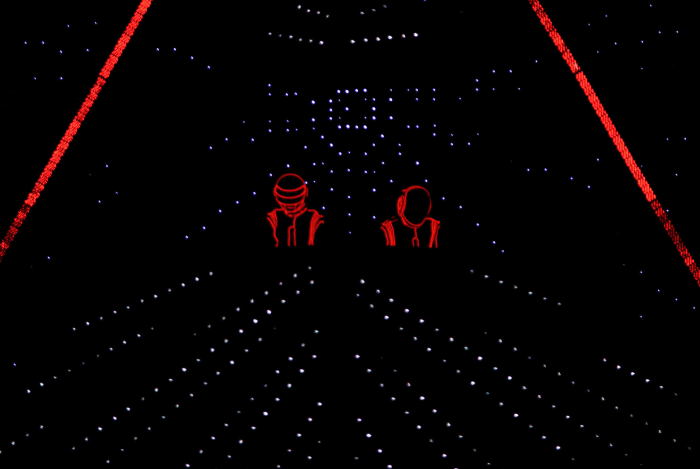
Although all of the singles released off the bots' sophomore record "Discovery" were all varying degrees of legendary, the band's strength really comes from their album tracks, and for passive Daft Punk fans, there is a wealth of incredible, colorful, explosive songs to be found. "Crescendolls" is one of those numbers, and by finding two incredible bits from The Imperials' 1977 song "Can You Imagine", the duo constructs an instrumental fireworks show of rising beats and euphoric release. At three and a half minutes, the loops are perfectly constructed, giving you just enough joy before the song ends and leaves you wanting more.
"Something About Us" (2001)

Once again touching on themes of unrequited love, "Something About Us" stands out from Daft Punk's early era as it is one of the rare times the bots went downtempo. Credited as the "Love Theme from Interstella 5555", their album-length anime that was used to promote the album, "Something About Us" hits different, with its syrupy thick bass, jazzy guitar chords, and understated keypads giving a rainy, nighttime feel that is distinct to their discography. In addition, the everyman vocal delivery gives the pining lyrics that much more of a bite, as if it's just a regular person experiencing feelings of great longing, expressing them perhaps for the first time. A wholly original composition free of samples, "Something About Us" really let fans know that there's a beating heart underneath those masks, and thankfully it wouldn't be the last time we get to see it.
"Face to Face" (2001)

A lot of problems and issues can exist in your head, but sometimes it's just easier to confront them ... face to face. One of the last singles released off of "Discovery", "Face to Face" is an electro-pop delight like no other. Riding a sturdy mid-tempo groove with a vocal assist from Todd Edwards, "Face to Face" is the kind of song that grows on you over time. With a colorful post-chorus sample break that culls nanosecond cuts from numerous legendary tracks (think "Evil Woman" by ELO and "House at Pooh Corner" by Loggins & Messina), it sometimes feels like music history is flowing through this scattershot burst of color. Still, with clearly defined verse and chorus sections (which isn't always the case when we're dealing with Daft Punk), "Face to Face" is yet another joyous facet of their boundary-breaking discography.
"Robot Rock" (2005)
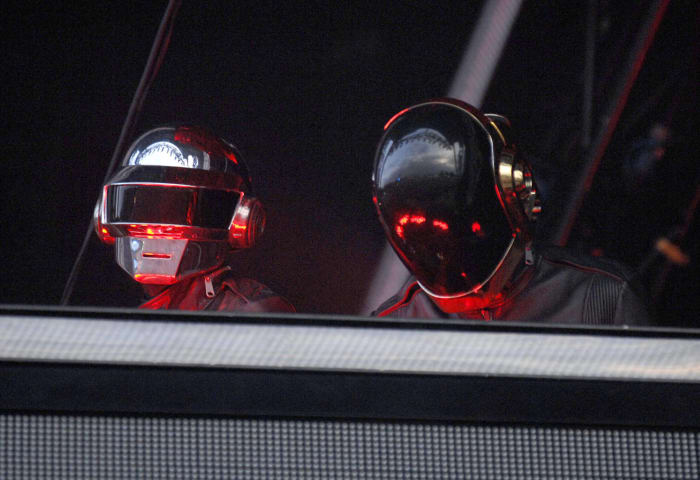
Had Daft Punk only released "Homework" and "Discovery", they still would've had an unquestioned legacy of being one of the most influential dance acts of all time. Yet as defining as their first two full-lengths were, the bots still pressed on, and 2005's "Human After All" was an experiment they felt they had to do. By giving themselves restrictions, they were hoping to unlock new creative avenues, and "Human After All", unfortunately, has a bit of a mixed reputation. While their heavier rock elements are welcome, that unique way they evolve their looping melodies is largely absent here, perhaps no more obviously than on lead single "Robot Rock". Using a dynamite sample from the little-known funk outfit Breakwater, "Robot Rock" hits you with a new kind of vibe but then keeps hitting you with it, over and over again without variation. It may not be their all-time best song, but it is an essential calling card for them, showing up frequently in live mixes and big action movies like "Iron Man 2". Necessary due to popularity.
"Technologic" (2005)

While "Human After All" may not be an end-to-end classic in the way Daft Punk's first two records are, their experiment in studio minimalism still managed to give us some great moments, and "Technologic" stands out as the bots' towering achievement from this era. Based on a rapid-speaking electro voice speaking to the beat, the duo uses this hypnotic verbosity to build a dynamite groove, leaning hard into the digital-rock sound they were aiming for, unafraid to give us some pure guitar speaker fuzz blowouts right as that crunchy bass hits its peak. Weirdly addictive and remarkably engaging, "Technologic" proved that Daft Punk could build something great out of a basic setup, even though they never quite challenged themselves in this manner again.
"Heartbreaker [Teriyaki Boyz]" (2006)
!["Heartbreaker [Teriyaki Boyz]" (2006)](http://res.cloudinary.com/ybmedia/image/upload/c_crop,h_1291,w_2000,x_0,y_0/c_scale,f_auto,q_auto,w_700/v1/m/d/d/dd3b5a0f1376a990a36805fab7f08c6a333121c6/heartbreaker-teriyaki-boyz-2006.jpg)
While the Teriyaki Boyz will always be known for their theme to the film "Fast & Furious: Tokyo Drift", this Japanese rap group still managed to be quite the name-droppers, working extensively with Pharrell and netting feature spots from the likes of Kanye West and Busta Rhymes. Yet the Teriyaki Boyz first big single was called "HeartBreaker", a "here's my name and here's what I do" kind of cipher, and it is built around a sample of Daft Punk's song "Human After All", with the bots receiving a production credit to boot. It's a fine enough song, but in terms of speaking to Daft Punk's worldwide influence, it showed that even their less successful material was powerful enough to cross language and cultural barriers in a way few other groups could dream of.
"The Prime Time of Your Life / The Brainwasher / Rollin' & Scratchin' / Alive" (2007)
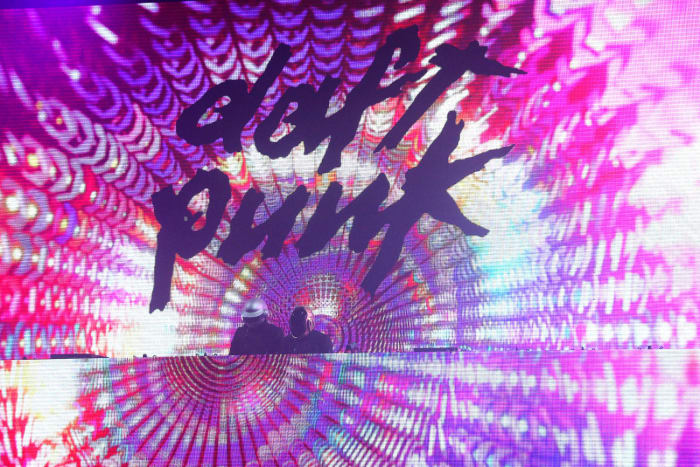
As revered as Daft Punk are as songwriters and producers, there's something to be said about how the bots performed in a live setting. Frequently appearing in their custom-made self-contained light-show structure known as "The Pyramid," a Daft Punk live experience was like no other because the duo managed to take their own discography and remix it in wild and compelling new ways. This was apparent on their legendary live record "Alive 1997" and perfected with their even better "Alive 2007". Right off the heels of "Human After All", the bots took even that album's lesser material and transformed it into something awe-inspiring with some deft and clever mashups. It's no better exemplified than on this track, wherein the "Human" cuts "Prime Time of Your Life" and "The Brainwasher" eventually merge with the legendary "Homework" tracks "Rollin & Scratchin'" and "Alive", making an all-time live dance hit that makes you almost feel like you're back in a stadium again. Shame we never got "Alive 2017" though ...
"The Son of Flynn" / "Derezzed" (2010)
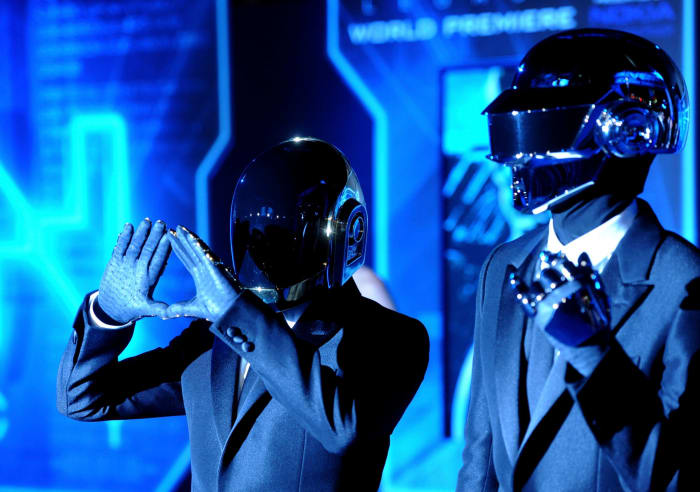
When it was revealed that there would be another movie in the "TRON" franchise, it made perfect sense that the soundtrack would be done by none other than Daft Punk themselves, clearly eager for a new challenge. What is remarkable about their score for "TRON: Legacy" is that while it's very much in the Daft Punk style, the duo isn't leaning hard into dance tracks or kitschy samples, treating the project like the job it is and giving a fully effective film score for us to take in. As such, while Daft Punk completists will want to breathe in the boys' powerful work, there isn't much in the way of pure dancefloor bliss, the lead single "Derezzed" being the closest they give to a full-on banger. Yet for those looking for a nuanced, expressive theme, "The Son of Flynn" carries the weight of the film's weighty emotions on its shoulders, making for a thrilling standalone work.
"Hypnotize U [N.E.R.D.]" (2010)
!["Hypnotize U [N.E.R.D.]" (2010)](http://res.cloudinary.com/ybmedia/image/upload/c_crop,h_1417,w_2000,x_0,y_0/c_scale,f_auto,q_auto,w_700/v1/m/8/e/8e1ed8c89cfae0669c63da0b382a2c45b89abf3c/hypnotize-u-nerd-2010.jpg)
Outside of both acts working with the Teriyaki Boys at various points, Pharrell gave his own Neptunes spin on "Harder, Better, Faster, Stronger" for the bots' 2003 remix record "Daft Club". With a relationship established, of course, the boys would help out Pharrell's N.E.R.D. project with some production work all their own, and "Hypnotize U" is an unusual R&B jam, filled with waves of synthpads and slight minor-key air to the whole affair, giving the track a low-simmer sinister vibe. It was so left field in a style that it unsurprisingly wasn't a hit, but that connection to Pharrell would pay off big dividends just a few years later ...
"Get Lucky [ft. Pharrell Williams]" (2013)
!["Get Lucky [ft. Pharrell Williams]" (2013)](http://res.cloudinary.com/ybmedia/image/upload/c_crop,h_1331,w_2000,x_0,y_0/c_scale,f_auto,q_auto,w_700/v1/m/3/1/31e4b29c5b5cba032784c6d7d807ed1c522268e3/lucky-ft-pharrell-williams-2013.jpg)
Now that Daft Punk has sunsetted their career, we can now look back at their fourth studio album proper "Random Access Memories" and recognize it for what it is: a celebration of pop music's glorious past and making sure true legends are never forgotten. "Get Lucky", with its ace vocal turn by Pharrell and a dynamite lead guitar riff from disco legend Nile Rodgers, was a breezy, horny jam that took the world by storm, becoming Daft Punk's biggest hit and 2013's "Song of the Summer", even if was cruelly kept out of the penthouse of the Billboard Hot 100, peaking at #2 for weeks on end. Imitated, covered, parodied, and beloved, "Get Lucky" felt like a culmination of Daft Punk's perfect pop instincts and reverence for all that '70s dance music had taught them. They are far from the first act to make disco sound cool in the contemporary world, but it could be argued that no one out-mirrorballed them.
"Giorgio By Moroder" (2013)

On Daft Punk's debut album "Homework", there's a song called "Teachers" which has the bots simply listing the names of influential dance figures that came before them over a simple beat. By the time they released "Random Access Memories", their idols are the ones working with them. Anchored by a spoken-word monologue from Giorgio Moroder, one of the most influential producers in all of pop music, the boys pull out all the live-instrumentation stops, going from slick disco grooves to full orchestral pop release with thundering drums. It's a nine-minute pop music primer that never once feels like homework (pun not intended) but instead building on pop music's glorious past to point towards a vibrant new future.
"Touch [ft. Paul Williams]" (2013)
!["Touch [ft. Paul Williams]" (2013)](http://res.cloudinary.com/ybmedia/image/upload/c_crop,h_1329,w_2000,x_0,y_0/c_scale,f_auto,q_auto,w_700/v1/m/3/3/33d8efb87ddd930385c8eaf4b09b0fa5df4c32f2/touch-ft-paul-williams-2013.jpg)
While "Random Access Memories" is full of remarkable musical asides and generation-defining pop hits, "Touch" feels like its musical apex, throwing in ragtime piano, funk bass, children's choirs, and cinematic intros and outros to create a maximalist masterpiece of pure composition. Spotlighting a longing vocal turn from songwriting icon Paul Williams, "Touch" is Daft Punk at their weirdest, wildest, and most satisfying. It's no wonder that they used the song's final orchestral minutes to soundtrack their career-ending "Epilogue" video: this eight-minute wonder is riddled with deep emotion.
"Doin' it Right [ft. Panda Bear]" (2013)
!["Doin' it Right [ft. Panda Bear]" (2013)](http://res.cloudinary.com/ybmedia/image/upload/c_crop,h_1620,w_2000,x_0,y_0/c_scale,f_auto,q_auto,w_700/v1/m/6/8/689ac94e4178c4643d790f3a5a008bddff59bde5/doin-right-ft-panda-bear-2013.jpg)
For all of the opulence of "Random Access Memories", one of the album's most memorable songs is the smallest in scale: "Doin' it Right", featuring Animal Collective's Panda Bear on vocals. Over a simple drum machine, synth line, and some classic cybervocals from the bots, "Doin' it Right" hits a hypnotic sweet spot where the digitized repetition of the phrase "doin' it right" in effect becomes its own instrument, with Panda Bear's indie-rock vocals soaring above it all. It feels like the kind of stripped-down pop bliss they were aiming for on "Human After All" but only came close to achieving. On "Doin' it Right", they pulled one of their most successful experiments to date.
"Starboy [The Weeknd ft. Daft Punk]" (2016)
!["Starboy [The Weeknd ft. Daft Punk]" (2016)](http://res.cloudinary.com/ybmedia/image/upload/c_crop,h_1783,w_2000,x_0,y_0/c_scale,f_auto,q_auto,w_700/v1/m/8/2/8243264b7c99014d19ed818d47dc2f84d0a8c516/starboy-weeknd-ft-daft-punk-2016.jpg)
There is no exaggeration in saying that The Weeknd is one of the strangest pop stars to ever go supernova, as Abel Tesfaye's lyrical world of drugs, sex, and never-ending hedonism feels so introverted and personal that it's surprising he's foisted it upon a global audience, posting some of the biggest streaming numbers of all time in the process. Even stranger is "Starboy", the title track to his third studio album proper, which ended up being one of his two outright collaborations with Daft Punk. Sinister, gloomy, and celebrating the decadence of success while giving off an air of loneliness all the same, "Starboy" feels like The Weeknd tapping into the dark underpinnings of Daft Punk's sound, which has always been there but would only occasionally come out in rare glimpses (see: N.E.R.D.'s "Hypnotize U"). Love it or hate it, there's no denying that it was a massive, game-changing hit.
"I Feel It Coming [The Weeknd ft. Daft Punk]" (2016)
!["I Feel It Coming [The Weeknd ft. Daft Punk]" (2016)](http://res.cloudinary.com/ybmedia/image/upload/c_crop,h_1434,w_2000,x_0,y_0/c_scale,f_auto,q_auto,w_700/v1/m/a/3/a3844e1103b45e96598a236180c67f5e2458fada/feel-coming-weeknd-ft-daft-punk-2016.jpg)
When The Weeknd dropped his undeniable dance-pop sensation "I Can't Feel My Face", there were some light comparisons to Michael Jackson in his prime. (And, to his credit, Tesfaye has invoked these before, covering "Dirty Diana" to eerie accuracy on an early mixtape.) Yet his voice mixed with indelible mid-tempo Daft Punk disco excellence? It sounds like what MJ could've done had he lived and been able to pull off a true and proper comeback. Sleek, accessible, and absolutely infectious, "I Feel It Coming" feels like both artists trading off each other's strengths, resulting in a throwback pop moment that nonetheless feels perfect for the immediate now. The only sad thing about this song? It ended up being the last track Daft Punk ever worked on, making for an unexpected but still oddly-fitting swan song.
Evan Sawdey is the Interviews Editor at PopMatters and is the host of The Chartographers, a music-ranking podcast for pop music nerds. He lives in Chicago with his wonderful husband and can be found on Twitter at @SawdEye.
More must-reads:
Trending in Entertainment
Customize Your Newsletter
 +
+
Get the latest news and rumors, customized to your favorite sports and teams. Emailed daily. Always free!
Use of this website (including any and all parts and
components) constitutes your acceptance of these
Terms of Service and Privacy Policy.

